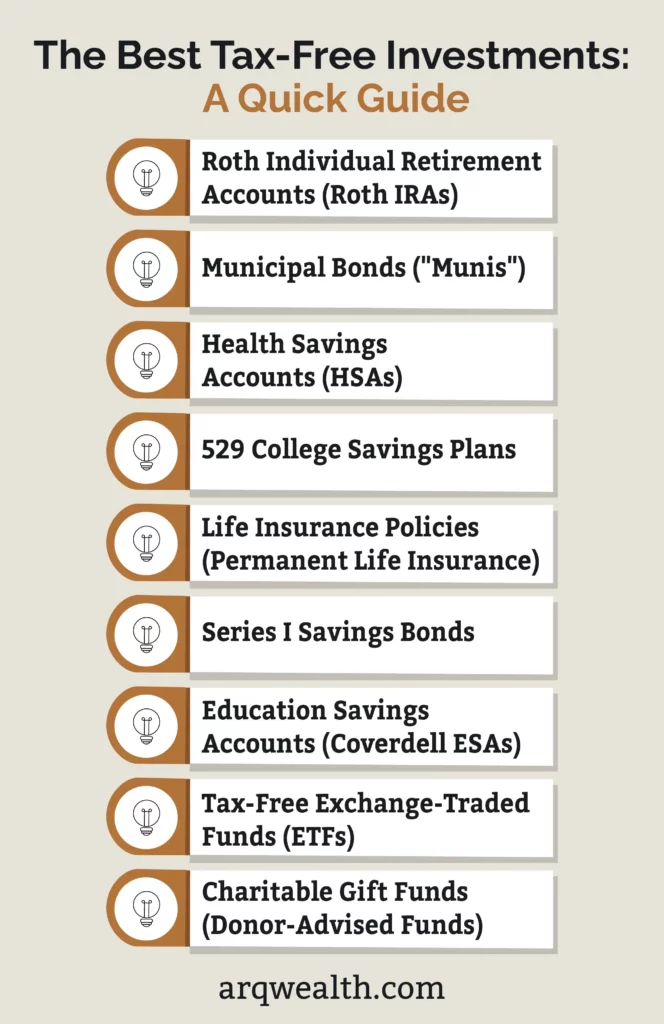It has been said that taxes are the biggest impediment to building wealth. While that may be true, taxes don’t have to be inevitable. Many investments come with a tax burden, but several provide an opportunity to grow your wealth without the worry that Uncle Sam will take a portion of your returns. This guide explores the best tax-free investment options, their benefits, and how they can complement your financial strategy.

Roth Individual Retirement Accounts (Roth IRAs)
Roth IRAs have become popular as a tax-efficient alternative to other retirement savings vehicles.
Unlike its older cousin—the traditional IRA—contributions to a Roth IRA are made with after-tax dollars, so you won’t get an immediate tax deduction.
However, the trade-off is significant: your money grows tax-free, and distributions in retirement are also tax-free as long as you meet certain conditions.
Key Benefits:
- Tax-free growth and withdrawals.
- There are no required minimum distributions (RMDs), allowing you to keep your money working for you.
- Income from a Roth is not included in the Social Security tax calculation.
- Roth funds can be used for purposes other than retirement.
- Ideal for those who expect to be in a higher tax bracket during retirement.
Limitations:
- Contribution limits: $7,000 annually (or $8,000 if you’re 50 or older) in 2025.
- Income limits for contributions: Single filers with modified adjusted gross income (MAGI) of less than $150,000 ($236,000 for joint filers) are eligible for a full contribution. Single filers with incomes between $150,000 and $165,000 ($236,000 and $246,000 for joint filers) are eligible for partial contributions. Incomes above those levels do not qualify for a contribution.
Strategy Tip: Maximize contributions to your Roth IRA early in the year to take full advantage of compound interest.
Municipal Bonds (“Munis”)
Municipal or tax-exempt bonds are debt securities issued by state or local governments to fund public projects like roads, schools, and hospitals. The interest earned on these tax-exempt securities is generally exempt from federal income tax and, in some cases, state and local taxes if you reside in the issuing state.
Key Benefits:
- Reliable, steady investment income that is tax-free at the federal level.
- Low default risk compared to corporate bonds.
Limitations:
- Lower yields compared to taxable bonds.
- Subject to market risk if sold before maturity.
- Some municipal bonds, known as private activity bonds, may be subject to the Alternative Minimum Tax (AMT).
Strategy Tip: Consider municipal bonds if you’re in a high tax bracket and seeking a stable, tax-efficient income stream.
Health Savings Accounts (HSAs)
HSAs offer a trifecta of tax advantages. Designed as an alternative to traditional healthcare insurance plans, they allow individuals and families to make tax-deductible contributions and invest them for tax-free growth. Withdrawals are also tax-free if used for qualified medical expenses. HSAs offer unmatched tax efficiency; you can even use them as retirement savings tools.
Key Benefits:
- Triple tax advantage: contributions, growth, and withdrawals are all tax-free.
- Unused funds roll over from year to year, unlike Flexible Spending Accounts (FSAs).
- After age 65, you can make non-medical withdrawals to cover retirement expenses, but they’re taxed like a traditional IRA.
Limitations:
- You must purchase a high-deductible health plan to cover major hospital expenses.
- Contribution limits: $4,300 for individuals and $8,550 for families in 2025, with a $1,000 catch-up contribution for those 55 or older.
Strategy Tip: Max out your HSA contributions and invest the funds to grow your nest egg while saving for future healthcare costs.
529 College Savings Plans
529 plans are tax-advantaged accounts designed to help families save for education expenses. Contributions grow tax-free, and withdrawals for qualified education expenses are also tax-free. Some states even offer tax deductions or credits for contributions to a 529 plan.
Key Benefits:
- Tax-free growth and withdrawals for qualified education expenses.
- Can be used for K through 12, vocational, and trade schools.
- High contribution limits, often exceeding $300,000 per beneficiary.
- Flexibility to change beneficiaries within the same family.
- Unused funds can be rolled into a Roth IRA.
Limitations:
- Non-qualified withdrawals are subject to income tax and a 10% penalty on earnings.
- Investment options are limited to those offered by the plan.
Strategy Tip: Start contributing early to take advantage of compound growth and consider front-loading contributions using the five-year gift tax exclusion rule.
Life Insurance Policies (Permanent Life Insurance)
Certain types of permanent life insurance, such as whole life or universal life, offer a tax-free growth component known as cash value. Policyholders can access this cash value through tax-free loans or withdrawals as long as the policy remains active.
Key Benefits:
- Cash value grows tax-deferred.
- You can take tax-free loans against the cash value.
- Beneficiaries receive the death benefit free of federal taxes.
Limitations:
- High premiums compared to term life insurance.
- Policy loans must be repaid to avoid reducing the death benefit or causing a policy lapse.
- Complex structures can make them less suitable for inexperienced investors.
Strategy Tip: Use permanent life insurance as part of an estate planning strategy or as a supplement to other tax-advantaged accounts.
Series I Savings Bonds
Series I Savings Bonds, issued by the U.S. Treasury, are designed to protect against inflation. These bonds pay a fixed rate plus an inflation-adjusted rate, and the interest is exempt from state and local taxes. The interest may also be exempt from federal taxes if used for qualified education expenses.
Key Benefits:
- Inflation protection with a guaranteed return.
- Exempt from state and local taxes.
- No federal taxes are owed if used for education expenses.
Limitations:
- Annual purchase limit of $10,000 per individual ($15,000 if using a tax refund).
- Must be held for at least one year, and there’s a three-month interest penalty if redeemed before five years.
Strategy Tip: Use Series I Bonds as a conservative, tax-efficient way to diversify your portfolio and hedge against inflation.
Education Savings Accounts (Coverdell ESAs)
Coverdell Education Savings Accounts are another option for saving for education expenses. Like 529 plans, contributions are made with after-tax dollars, account earnings are not taxed, nor are withdrawals used for qualified education expenses. Coverdell ESAs can be used for K-12 expenses in addition to college costs.
Key Benefits:
- No taxes on growth and withdrawals for qualified education expenses.
- Can be used for private school tuition and other K-12 expenses.
Limitations:
- The contribution limit is $2,000 per beneficiary per year.
- Income limits for contributors: single filers with MAGI over $110,000 and married couples filing jointly with MAGI over $220,000 are ineligible.
Strategy Tip: Combine a Coverdell ESA with a 529 plan for maximum tax efficiency when saving for education.
Tax-Free Exchange-Traded Funds (ETFs)
While not designed as tax-free investments, some ETFs are designed for tax efficiency. Municipal bond ETFs, for instance, offer the tax advantages of individual municipal bonds in a diversified, easy-to-trade package.
Key Benefits:
- Diversified exposure to municipal bonds.
- Zero taxes on income at the federal level and potentially state and local levels.
- Good liquidity and low expense ratios.
Limitations:
- Subject to market fluctuations.
- May include bonds subject to the AMT.
Strategy Tip: Look for low-cost municipal bond ETFs to add tax-free income to your portfolio.
Charitable Gift Funds (Donor-Advised Funds)
Donor-advised funds allow investors to make charitable contributions, receive an immediate tax deduction, and recommend grants to their favorite charities over time. Investment growth within is not taxed.
Key Benefits:
- Even if a charity grant is delayed into future years, there is an immediate tax deduction for contributions.
- No taxes on the growth of invested funds.
- Flexibility to support charities over time.
Limitations:
- Contributions are irrevocable.
- Fees may apply to manage the fund.
Strategy Tip: Use donor-advised funds to maximize charitable giving while growing funds free of taxes.

Conclusion
As with any investment decision, you must consider your unique financial situation, goals, and risk tolerance. Any investment strategy with tax implications should be considered with the help of a qualified financial advisor.
The advisors at ARQ Wealth are well-equipped with the tools and expertise to help you navigate these options and create a personalized investment plan that leverages the benefits of tax-free growth and income.
Call ARQ Wealth at (480) 214-9572 to speak with a financial advisor, or use our contact form to schedule an appointment.

